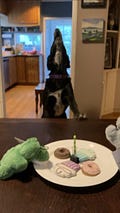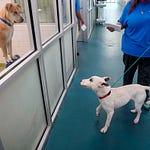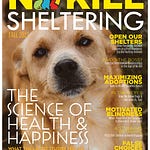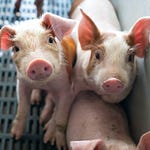Prince celebrates his Gotcha Day! As more people turn to rescue and adoption and more shelters embrace progressive policies, this could be the story of every shelter animal in America.
The AKC wants you to believe that a dog shortage has reached crisis proportions. A gender studies professor objects to helping disabled dogs and cats gain mobility. Raleigh, NC, criminalizes compassion for “feral” cats. There are no chickens in the new “chicken” nuggets for sale at the stadium of the San Francisco Giants. The market for vegan meats will increase five-fold over the next 10 years. A Federal Court of Appeal has ruled that a Kansas law making it illegal to film and publicize animal abuse on farms violates the First Amendment. A new study finds “that pets owned by people experiencing homelessness” are as healthy “as the general pet population.” The number of communities placing over 95% and as high as 99% of the animals is increasing. The youngest orca at SeaWorld in San Diego has died. And a new study out of Oregon State University set out to answer the question: Do cats love us? No surprise, they do.
These are some of the stories making headlines in animal protection:
Is there a "Great American Dog Shortage"? The AKC wants you to believe that there is. They also want you to believe that shelter and rescue dogs are dangerous and the only way to meet demand is to expand commercial breeding. But what do we find when we follow the evidence instead of the money? What we find is that rescue and shelter dogs can meet demand, that these dogs are dying for homes, and that the vast majority are healthy, friendly, and pose no threat. We don’t need to factory farm dogs.
Dymka, a cat suffering from frostbite that required amputation of all four of her legs, is walking again thanks to 3D printed titanium legs. She’s one of many dogs and cats who were either born with a disability or suffered accidents but are being helped by prosthetics or wheelchairs. Unfortunately, not everyone is celebrating. In a new book, a professor of gender studies at Kansas State University, tragically objects to these stories, claiming they “reveal salacious and almost pornographic exceptionalizations of disabled bodies” and “erase” the experiences of disabled people. They do no such thing.
An animal control officer in Raleigh, NC, is accusing the mayor of feeding a feral cat in violation of law. The Mayor said that the City will be “fining me at my house every day. I have my favorite feral cat and he is like one of the family.” Banning the feeding of community cats, she says, “goes a little too far.”
There are no chickens in the new “chicken” nuggets for sale at the stadium of the San Francisco Giants. The new nuggets are part of an overall growth in plant-based foods with Bloomberg reporting that the market for vegan meats will increase five-fold over the next 10 years: from $30 billion in sales to over $160 billion. That is good news for animals, including chickens, who are the most abused animal in the world, with over 60 billion killed every year to be eaten.
A Federal Court of Appeal has ruled that a Kansas law making it illegal to film and publicize animal abuse on farms violates the First Amendment. The Court held that Kansas may not legislate speech in order to prevent undercover investigations that expose inhumane conditions. It is a victory for anyone who has spoken out on behalf of animals abused and killed in any context.
A new study finds “that pets owned by people experiencing homelessness” are “as healthy as the general pet population, even finding that the animals are less likely to be overweight.” People of all walks of life love their pets.
As more people turn to rescue and adoption and more shelters embrace progressive policies, the number of communities placing over 95% and as high as 99% of the animals is increasing:
Ewing Township, NJ, reported a 99% placement rate for dogs, 99% for cats, and 100% for other animals. It is part of the most exclusive club in the movement: those placing 99%+.
Pequannock Township, NJ, reported a 100% placement rate for dogs, 98% for cats, and 100% for other animals. For dogs and rabbits and other small animals, it, too, is part of the most exclusive club in the movement.
Likewise, Porter County, IN, reported a 97% placement rate for dogs and 97% for cats.
The shelter that serves the cities of Bridgewater, Manville, and Green Brook, NJ, reported a placement rate of 98% for cats, 98% for dogs, and 100% for other animals.
Marquette, MI, reported a placement rate of 96% for dogs, 98% for cats, and 98% for rabbits, hamsters, and other small animals.
Fulton County, IN, reported a 100% placement rate for dogs and 97% for cats.
West Milford, NJ, also reported a placement rate of 95% for cats, 98% for dogs, and 100% for other animals.
These shelters and the data nationally prove that animals are not dying in pounds because there are too many, because there are too few homes, or because people don’t want the animals. They are dying because people in those pounds are killing them. Replace those people, implement the No Kill Equation, and we can be a No Kill nation today.
In tragic news, the youngest orca at SeaWorld in San Diego has died. The company does not know why. Amaya was only six years old. She is at least the fifth young whale to die in captivity across marine parks in the U.S. this year, many of them suddenly with some experts opining that it is captivity itself which is to blame. SeaWorld is no stranger to poor care and early death of orcas which led the California Coastal Commission in 2015 to ban the breeding of orcas at SeaWorld and ruled that no new whales from the wild could be kept there.
And, finally, we all know how much we love our cats, but a new study out of Oregon State University set out to answer the question: Do they love us back? OSU researchers recruited people and their pet cats to determine whether cats, like dogs, see their caregivers as surrogate parents. The study found — to the surprise of no one who has ever lived with cats — that they do. In fact, their attachment was as good as children and better than dogs.
While some have suggested that the study was a waste of time and money and that anyone with cats could have told researchers that, studies like this are still important. As long as they are non-invasive, voluntary, and allow the cats to quit or walk away if they are bored or stressed, the studies help overcome a bias in the scientific community of “underestimating cats' socio-cognitive abilities.” And having more studies conclude that cats have a rich inner life, deep feelings, and a great capacity for love can only serve to increase their status and the view of their moral worth. This is important because it is not just university researchers who have this bias.
This view of cats is also historically endemic in the sheltering community. Shelters often treat cats as second-class citizens, with the bulk of program resources, socializing efforts, and volunteer time spent with dogs. This isn’t necessarily because people love dogs more and cats less, but because they believe that dogs need more and cats are relatively low-maintenance. This study and others like it prove that cats suffer psychologically if not provided stimulation, socialization, and made to feel loved and safe. They deserve a fair share of sheltering resources. And we can use studies like this to push shelter managers to make sure they get it.















This Week in Animal Protection